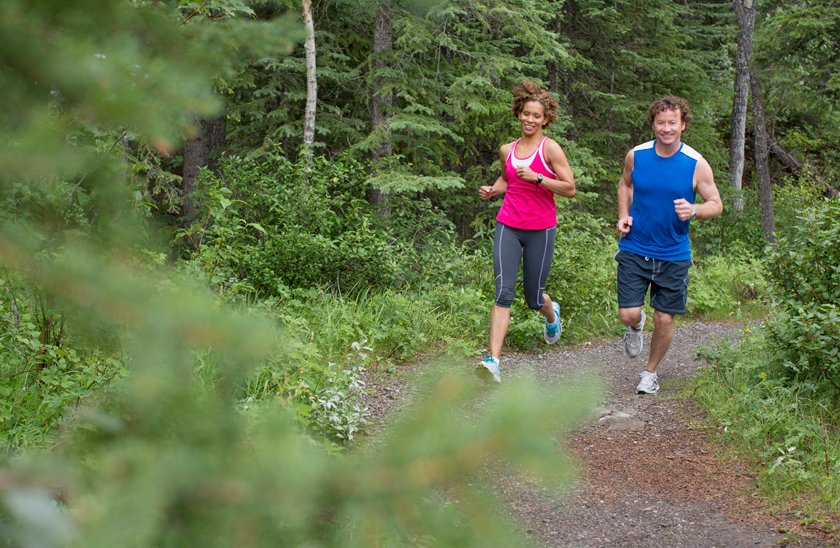Bored with running? Liven things up by trading the pavement for the trail. Trail running has grown in popularity in the recent years, and for good reason. Not only is trail running more forgiving on your body than your typical road run, it also burns more calories, improves your balance and strengthens your core. Trail running for beginners is not as complicated as it may seem, although there are a few things you should know before making the transition.
Getting Started: Know the Basics
What are some of the differences you can expect when you start trail running? For starters, there’s less impact on your body. Running on harder surfaces, like sidewalks and treadmills, applies more force to your body, which can lead to injuries. The dirt, gravel or grass found on trails offers a softer surface for less impact on your joints.
Don’t expect to hit any personal records during your first few trail runs. Trail running forces you to constantly adapt and move side-to-side to navigate around rocks, tree limbs and other obstacles. Expect your pace to be as much as 20% slower when you first begin running trails, according to Runner’s World. Forget your usual pace and just enjoy yourself.
You’ll also need to adapt your stride in order to keep your feet under you. Shortening your stride keeps your body weight over your feet, allowing you to quickly react to obstacles without losing your balance.
It’s important to scan the ground several feet in front of you as you run to help prevent trips and falls. When you see something in your path, do what you can to step over it rather than on it. Rocks and roots are often slippery, especially when wet.
Learn more about getting fit.*
Getting Started: Get the Gear
Before you hit the trail, you will need a few pieces of gear to make the most of your run. This includes
- Clothing. You can run in the same thing you wear when you run now, but make sure to choose items you don’t mind getting wet or muddy.
- Shoes. If you’re going to run trails regularly though, you’ll want to invest in trail-running shoes. These trainers protect your feet better than road shoes by offering a thicker sole and increased stability on uneven terrain.
- Hydration. If you run with a favorite water bottle or hydration pack, you can use the same one. Just don’t forget it because there aren’t water fountains along most trails!
- Insect repellent. You might not need to ward off mosquitoes and ticks while you’re running on the roads, but the Tennessee woods are full of blood-sucking bugs, so it’s best to be prepared.
Getting Started: Find Your Way
From local to state to national military parks, Tennessee offers a ton of places to go for a trail run.
The Nashville area alone has more than 190 miles of trails, ranging from paved greenway trails to wooded trails along cliffs overlooking Percy Priest Lake. Knoxville runners can enjoy the Knoxville Urban Wilderness Corridor and other local off-road runs, but don’t overlook the nearby Great Smoky Mountains National Park or Big South Fork National River and Recreation Area.
Chattanooga boasts more than 150 miles of trails along the Tennessee River within a quick drive from downtown, offering plenty of opportunities for trail runners of all skill and fitness levels. The Shelby Farms Park Conservancy in Memphis boasts 4,500 acres of both paved and unpaved trails.
For help finding a trail near you, visit the American Trail Running Association’s free directory.
Most outdoor activities have some level of risk, and you may need to consult an expert before engaging in the activity. Always check the current weather conditions before embarking on any outdoor activity.
Consult your doctor before beginning any diet or exercise program.
Get more information about specific health terms, topics and conditions to better manage your health on bcbst.com. BlueCross BlueShield of Tennessee members can access wellness-related discounts on fitness products, gym memberships, healthy eating and more through Blue365®. BCBST members can also find tools and resources to help improve health and well-being by logging into BlueAccess and going to the Managing Your Health tab.



WellTuned provides inspiration and practical advice for healthy living.
WellTuned does not offer medical advice. Any personal health questions should be addressed to your doctor.